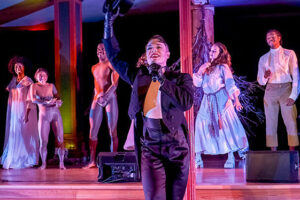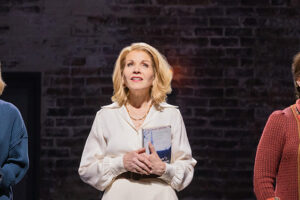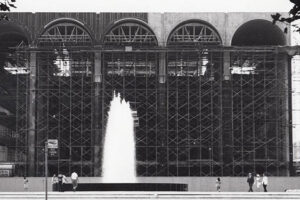

For this reason, and the slippery borders and frequent occupations of history, Polish singers have been distinguished for their suppleness in matters of language and national style—they triumph not only in Italian and French music, and in German, but also in Czech and in Russian. They never have the problems, those nasal gulps, that often afflict Russian singers trying to perform western music.
At the Met, the Polish tenor Piotr Beczala has won a devoted following in Italian, French, Czech and Russian operas. (He is scheduled to sing Lohengrin opposite Anna Netrebko in Dresden in the spring, 48 is a good age to take on Wagner if you are going to do so.) His New York recital debut at Zankel Hall mixed Schumann’s Dichterliebe, sung in impeccable German, with less familiar songs by three Slavic composers in three Slavic tongues. Beside two German encores, there was one, Helen Taylor’s “Bless this House,” in creditable, comprehensible English.
In an era replete with strapping tenors, Beczala makes a handsome stage presence, slim and broad-shouldered. He is an affecting actor, as his petulant Lensky and slimy Duke of Mantua have demonstrated, and possesses a voice of good size and an attractive grainy quality. He ranges easily from a baritonal lower register through a secure middle voice to a top that can ring satisfyingly but, on the basis of Friday night’s recital at as part of the Julia Goldwurm Pure Voice Series, is sometimes a little pallid, a little breathless at the end of a fading high phrase.
Schumann’s Dichterliebe is an easy, indeed far too frequent choice for male recitalists. The emotional range of this cycle is narrow, the neuroses surface. Heine’s faux naive little poems to their slight melodies can show off a singer’s vocal range, as Beczala demonstrated in “Ich grolle nicht,” but the inner life of the masochistic poet who is the apparent protagonist does not open the depths of the love-wracked soul. Mahler accomplished twice as much in just four songs with his Wayfarer Songs. I especially enjoyed the more narrative, less personal songs, “Im Rhein,” “Aus alten Märchen,” “Die alten, bösen Lieder.”
Adding to Beczala’s emotional distance was his close attention to a music stand—evidently he has not got them in his head yet. That does not upset me too much, but it underlined lack of acquaintance with the material—he was not telling familiar stories or dredging bitter feelings from his heart; he was “reading through” a set of simple tales.
The contrast was the striking when, as one of his encores, he performed “Mein” from Die Schöne Müllerin, which cycle, he told us, he’d just recently performed for the first time. The precision of the music and the excellence of his German resembled his approach in the Dichterliebe, but the character came through, in all his neurotic joy. There was an intensity that had been lacking—Beczala seemed to know the guy through and through, and could therefore communicate him to us. I wish he’d done that entire cycle here!
Far more entertaining and involved in emotional range and melodic style were the three sets of songs in the second half of the program, by Mieczyslaw Karlowicz, Antonin Dvorak and Sergei Rachmaninoff.
Karlowicz’s death, in a mountain-climbing accident at 32, deprived Poland of a talented melodist with something of the flavor of his contemporaries, Lehár and Kálmán. (Beczala recently recorded an album of operetta hits, Mein Ganzes Herz.) The singer was more relaxed and ardent in seven of Karlowicz’s songs, notably the lovely and reflective “Pamietem ciche” and “Najpiekniejsze,” the epigrammatic images of “Mow do mnie jeszcze,” which allowed him to demonstrate an easier phrasing technique, and the many Poles in the audience responded joyously.
Dvorak’s Gypsy Songs are not unfamiliar, in several languages—though he set them all to Czech texts. The common theme, here as in so many of the other songs, was to praise or analyze the effect of song itself. In “Struna naladena,” Beczala demonstrated an easy swell and diminuendo to the philosophic text. In “Siroke rukavy,” he enacted the vigorous (if mythical) heroic and defiant Gypsy. “Kdyz mne stara matka zpivat” (Dvorak’s best-known song, usually translated “Songs My Mother Taught Me”) was sung as an old chestnut should be sung on such a program: with a freshness, a reconsideration of the text and its melody, that made it new and affecting.
A set of Rachmaninoff songs made an interesting contrast to the sumptuous but unsubtle readings of many of the same songs in Carnegie’s main hall last month by Hibla Gerzmava (and the tender readings of Krassimira Stoyanova of those same songs a few years ago in Carnegie’s Weill Hall). Beczala pictured the “Lilacs” for us where Gerzmava let her huge voice carry her over the sentiment, and exulted in the coming of the “Vesenniye vody,” the spring waters. But he was especially thrilling in Rachmaninoff’s most famous song, “Ne poi, krasavitsa” (Sing not to me, maiden), using a pale and ghostly voice to summon the Apparition of old love that the girl in the song arouses so poignantly.
All this made a very happy second half of the evening. We settled back in our chairs to enjoy ourselves, and the singer gave the impression that he was more relaxed as well, not as on edge as the Schumann songs, however well achieved, had placed him. Accompanist Martin Katz, as usual, had tremendous fun with Schumann’s atmospheric piano parts that foretell or linger over the poetic songs.
Photo by Johannes Ifkovits.























Comments